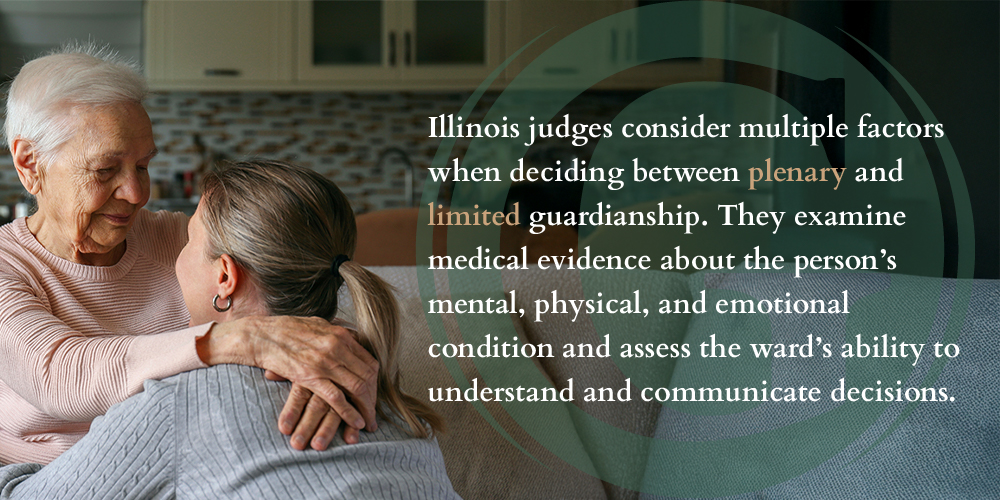Plenary vs. Limited Guardianship in Illinois: How Do You Decide?

When someone you love cannot manage their personal or financial affairs, it can be overwhelming trying to figure out how to help them. Families in Illinois often turn to guardianship as a solution, but many are unsure whether a plenary or limited guardianship is the right choice. Understanding the differences between these options and how courts approach these cases is crucial.
If you are considering guardianship, talk first to our Naperville, IL guardianship and estate planning attorney, Denice Gierach. Attorney Gierach has been practicing for more than 30 years and has extensive experience guiding families through difficult guardianship and other estate planning decisions. With our help, you can protect your loved ones and plan for the future.
What Does Guardianship Mean in Illinois?
Guardianship is a legal arrangement where a court appoints a responsible adult to make decisions for another person, known as the ward, who is unable to make decisions for themselves due to age, illness, or disability. The Illinois Probate Act governs guardianships and provides two primary types for adults: plenary guardianship and limited guardianship.
A plenary guardianship gives the guardian full authority over all personal and financial decisions for the ward. This means the guardian can make choices about healthcare, living arrangements, and how to manage property or income. A limited guardianship, on the other hand, grants authority only in specific areas where the ward needs assistance, allowing them to retain decision-making power in other aspects of their life.
Why Would a Court Appoint a Plenary Guardian?
Plenary guardianship is generally reserved for situations where a person is fully unable to manage their affairs. This may include an elderly parent with advanced dementia who no longer understands medical instructions or an adult with profound intellectual disabilities who cannot communicate effectively. Courts in Illinois require detailed medical evidence, often including a physician’s report, to establish that the person is unable to make sound decisions.
One key reason families seek plenary guardianship is to provide comprehensive oversight and protection. Without full guardianship, vulnerable adults may be at risk of exploitation or harm because no one has the legal authority to intervene in all areas of their lives.
When Would Limited Guardianship Be a Better Fit?
In cases where the person still has some decision-making capacity, a limited guardianship may be more appropriate. For example, a young adult with mild cognitive impairments may be perfectly capable of deciding where they want to live or what they want to eat, but may need help managing finances or consenting to medical treatment. Limited guardianship allows the court to tailor the guardian’s powers to the ward’s specific needs, which helps preserve independence and dignity.
Families often ask whether a limited guardianship can provide enough protection. In Illinois, courts take the principle of “least restrictive means” seriously. Judges strive to grant only as much authority as is absolutely necessary and encourage solutions that safely empower the ward as much as possible.
How Does the Court Decide Which Type of Guardianship to Grant?
Illinois judges consider multiple factors when deciding between plenary and limited guardianship. They look closely at medical evidence about the person’s mental, physical, and emotional condition. They also assess the ward’s ability to understand and communicate decisions. If the person demonstrates partial capacity, the court will likely lean toward a limited guardianship unless there are compelling reasons for full authority.
Families often wonder whether they can present their concerns to the court. The answer is yes. During a guardianship hearing, relatives, medical professionals, and the proposed guardian can all share information about the ward’s condition and needs. The ward may also participate if they are able to do so.

Can a Limited Guardianship Be Changed Later?
Another common question is whether guardianship arrangements are permanent. In Illinois, guardianship orders can be modified. If the ward’s condition declines, the guardian or another interested party may ask the court to expand a limited guardianship into a plenary one. Conversely, if the ward improves, the court can scale back or even terminate guardianship altogether. Regular court reviews ensure the arrangement continues to serve the ward’s best interests.
Are There Alternatives to Guardianship?
Before petitioning for guardianship, families may want to explore less restrictive options. Powers of attorney allow a person who still has legal capacity to name someone to handle healthcare or financial matters on their behalf. Supported decision-making agreements are another tool that helps people with disabilities make choices with guidance from trusted supporters. For managing government benefits, families can request that a representative payee be appointed without going through a guardianship process.
What Steps Should Families Take Before Filing for Guardianship?
If you are unsure whether your loved one needs a plenary or limited guardianship, the first step is to consult with a qualified attorney. We can help you gather the necessary medical documentation and evaluate whether guardianship is the best option. It is also important to discuss the decision with other family members to avoid disputes during the court process.
What Are the Responsibilities of a Guardian?
Families often ask what it means to take on the role of a guardian, especially if an aging parent is asking one sibling to take responsibility for another sibling. First and foremost, guardians in Illinois have a legal duty to act in the best interests of the ward. This includes filing regular reports with the court about the ward’s well-being and finances. A plenary guardian will be responsible for every aspect of the ward’s life, while a limited guardian will focus only on the areas defined in the court order.
In terms of what this means for the daily life of a guardian, it can help to think of being a guardian as stepping into the shoes of a parent in many important ways. It means you might be the one talking to doctors, approving medical treatments, and making sure they are safe and cared for each day.
You may need to manage the ward’s finances carefully, paying bills, keeping records, and filing reports to the court so the judge knows you are protecting their assets properly. You will also be expected to visit regularly, advocate for their needs, and make decisions that are always in their best interest – not necessarily what is easiest or most convenient. It is a role that requires patience, attention to detail, and a lot of love, because you are essentially becoming their voice and their protector when they can no longer advocate for themselves.
Contact a Naperville, IL Estate Planning Attorney for Plenary and Limited Guardianship
Deciding between plenary and limited guardianship can be one of the most challenging decisions a family faces. The attorneys at Gierach Law Firm guide families through this process with knowledge and care, helping them protect their loved ones while respecting their rights. To schedule a consultation with our Naperville, IL guardianship attorney, call us today at 630-756-1160.
Practice Areas
Archive
+2016
+2013
Please note: These blogs have been created over a period of time and laws and information can change. For the most current information on a topic you are interested in please seek proper legal counsel.














